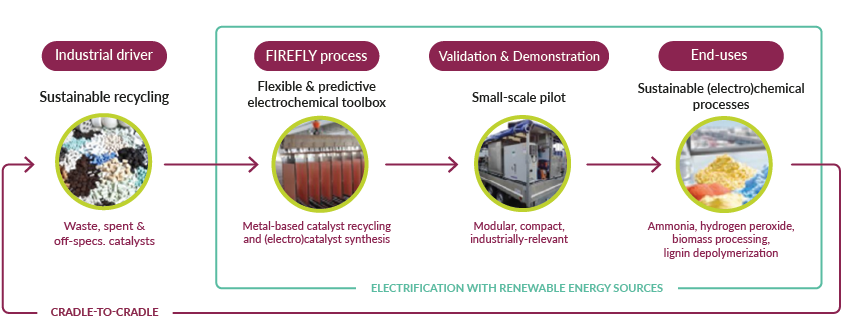The FIREFLY project (FlexIble, predictive and Renewable Electricity-powered electrochemical toolbox For a sustainable transition of the catalyst-based European chemicaL industry) is the pioneering research initiative aimed at driving the catalyst-based chemical industry towards electrification while reducing external reliance on metals and fossil fuels
The FIREFLY concept utilises electricity issued from renewable energy sources (RES) to manufacture (electro)catalysts from secondary resources, presenting a novel sustainable approach that will significantly reduce production costs. This initiative underscores a commitment to circularity, introducing more profitable routes for the chemical industry by predominantly using spent, waste, and off-specification catalysts from various industrial applications.
Central to the FIREFLY concept are several key developments:
- Advancement of electro-driven technologies for metal recycling from spent, waste, and off-specification catalysts available in Europe.
- Efficient integration of renewable electricity in the process.
- Implementation of a digital tool to support the decision-making in the enhanced metal recycling and catalyst synthesis processes.
- Production of (electro)catalysts for innovative (electro)chemical processes that overcome traditional production routes associated with high operating conditions, greenhouse gas emissions, and lack of circularity.

By incorporating renewable energy sources in the production of (electro)catalysts from secondary resources, FIREFLY not only reduces costs but also promotes sustainability within the chemical industry. Through the utilisation of spent, waste, and off-specification catalysts, the project embraces circularity, offering more viable pathways for the chemical industry.
By leveraging downstream synthesis of strategic metal-based (electro)catalysts, the FIREFLY project is expected to develop a sustainable process for the flexible, RES-powered electro-driven metals recycling at TRL6. This positions the project at the forefront of establishing the foundations of the electrified chemical industry.
Founded on a multidisciplinary approach encompassing electrochemistry, renewable energy, modelling, ammonia and hydrogen peroxide production, and biomass transformation, the FIREFLY project is coordinated by the Flemish Institute for Technological Research (VITO).
Consortium members


The FIREFLY project has been funded by the European Union under Grant Agreement N° 101091715. Views and opinions expressed within the project’s scope are solely those of the author(s) only and do not necessarily reflect those of the European Union or the European Health and Digital Executive Agency. Neither the European Union nor the granting authority can be held responsible for them.


